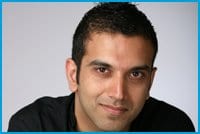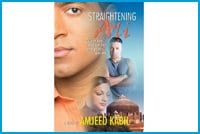When modern Western values clash with non-Western traditions, the differences can be irreconcilable. That’s the harsh reality tackled in Straightening Ali, a new novel by first-time British-Pakistani author Amjeed Kabil.
The book chronicles a few days in the life of the title character, a young British-Pakistani man whose family arranges for him to marry a girl even though he’s told them he’s gay. In these few days Ali is forced to choose between a series of polarities: between his fiancée and his male lover; between his familial obligations and his personal happiness; between his cultural identity and his sexual identity.
“I would say around 70 percent is based on real events,” says Kabil from his home in Birmingham, UK. “Some of my own experiences of living in a British-Pakistani household are reflected in Ali’s story as well,” he says.
“My parents came to England in the 1950s and then brought their family up in accordance with their traditional values, which sometimes conflicted with Western ones,” he says. “This has given me a unique insight into the gay British-Asian experience… and a wealth of stories to write about.”
One of the novel’s strengths is that it doesn’t sugarcoat the very real divide between modernism and traditionalism, the secular and the religious. Ali leaves his wife shortly after the wedding night, and there is no easy reconciliation between Ali and his family.
Kabil, too, left the wife his family had chosen for him, and the reconciliation with his family was slow and arduous. “They obviously wanted what they thought was best for me,” says the 35-year-old, whose day job is in the social housing field. “They could not understand why I wanted to leave after the wedding night. To them I had looked perfectly happy on my wedding day. There was a lot of hurt on both sides.
“I went for the shock factor on my first visit [after a two-year estrangement], you know, bleached hair, pierced tongue and a nice tattoo on my leg. I remember my sister uttering, ‘Oh my God. He’s become camp.’ My thought at the time was, ‘Where the heck did she learn to use the word “camp?”
“Nowadays, the relationship has evolved. There is some semblance of peace and calm. I visit my mother every couple of weeks and try and ring her every Sunday. My brother has stopped antagonizing me and started to use the ‘G’ word to describe me — you know, gay. He’s even said something which was as close to acceptance as he could get. It went something like, ‘I know you’re gay but why can’t you get married like all the other queers in the community?'”
Reconciliation with the larger Pakistani community has been more difficult. “I have had people from my community crossing the road when they’ve seen me, and I have yet to get an invite to a wedding of a relative. In fact I have been completely cut off from anything to do with the community.
“One of the lowest points was finding out that my grandfather had passed away and that I could not go to his funeral due to what the community would say. The same applied to my sister’s wedding.” Which leads Kabil to his blunt conclusion: “I personally think being gay and Muslim are not compatible and there is conflict for me with practising the religion knowing what mainstream Islam’s homophobic view is.
“I could be wrong about this and I know a lot of people might disagree with me. There are various Islamic gay activist groups that are trying to encourage Islam to be more accepting and, hopefully, in time they might make some inroads…. However, right now, I need more convincing.”
Not that there aren’t instances in Pakistani or Islamic culture where same-sex goings-on are tolerated. “In Pakistani culture, as long as you’re married and have children, it’s acceptable for the men to play around with other men,” says Kabil. “It’s something that happens a lot but isn’t spoken about. The attitude is that it’s okay as long as they’re married, have kids and have done their duty to the family.
“In Pakistan it’s considered part of life for men to experiment with each other before they settle down and get married — usually an arranged marriage. It’s considered to be a phase they go through — a bit of masti, or harmless fun. Therefore, there is some level of acceptance as long as they’re not out and proud and ‘shaming’ the family.”
Interestingly, when Kabil visited his ancestral homeland, it wasn’t the country his parents had led him to believe it would be. “Pakistan has moved on since the ’50s. It’s developed and grown. I remember when I visited I was surprised by just how much. In the cities like Islamabad it was surprisingly liberal,” he says, though acknowledging that the rural villages are still conservative.
“My parents’ generation has struggled with Britain’s liberal values and they’ve found it difficult to reconcile the differences,” he reflects. “However, this is changing slowly. My parents’ generation has made mistakes with my generation, forcing arranged marriages or taking their children back to Pakistan and getting them married to someone who has nothing in common with their child. However, this is changing, and the second generation which was born in Britain is making its own decisions.
The novel’s themes will certainly resonate as strongly here in Canada — probably the most multicultural, postmodern country in the world. “I have a love and fascination with Canada,” says Kabil. His only complaint, he says, is with the Canadian accent. “I had a little problem with it.”


 Why you can trust Xtra
Why you can trust Xtra


